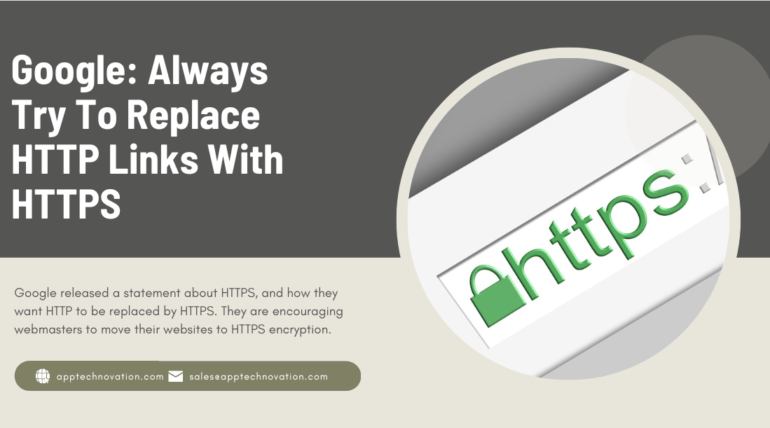Google released a statement about HTTPS, and how they want HTTP to be replaced by HTTPS. They are encouraging webmasters to move their websites to HTTPS encryption. Websites that use HTTP are not encrypted, which means that if someone can intercept the traffic on the way to the server browser they can go through your data.
HTTP vs. HTTPS: What’s the Difference?
HTTP and HTTPS are two types of web communication protocols. They are both used to transfer data between a web server and a web browser. However, HTTPS is a more secure protocol because it uses SSL (Secure Sockets Layer) to encrypt data. This makes it more difficult for hackers to intercept and read data that is being transmitted. Therefore, it is always best to use HTTPS whenever possible.
Change HTTP Links to HTTPS
If you’re a webmaster, it’s important to make sure that your website is accessible over HTTPS. Google has been working to make the web more secure by encouraging website owners to switch from HTTP to HTTPS.
HTTPS is more secure than HTTP because it uses SSL/TLS encryption to protect communications between web browsers and servers. This means that data sent over HTTPS is less likely to be intercepted and tampered with by third parties.
Switching your website from HTTP to HTTPS is relatively easy and can be done using standard web hosting tools. Once you’ve made the switch, you should update all of your links to point to the new HTTPS URLs. Google has said that they will give preference to websites that use HTTPS in their search rankings, so it’s worth making the switch if you want your site to be visible in Google search results.
How Do I Know If My Site Has an HTTPS Problem?
If your website has a lot of HTTP links, you may be experiencing an HTTPS problem. Google Chrome and other browsers will eventually start displaying warnings on websites that don’t have HTTPS. This is because HTTP is not as secure as HTTPS, and websites that don’t have HTTPS are at risk of being hacked. To fix this problem, you need to replace all of the HTTP links on your website with HTTPS links. You can do this yourself or hire a web developer to do it for you.
Fixing HTTP Pages
If you’ve been following Google’s advice to move your site to HTTPS, you may have noticed that a lot of your HTTP pages are still showing up in search results. This is because we haven’t yet updated our index to prefer HTTPS pages.
We’re working on changing that, and in the meantime, we suggest that you try to fix as many HTTP pages as you can. We realize that this isn’t always possible, but it’s something we recommend.
If you’re not sure how to do this, our Webmaster Central Blog has a post that can help: https://developers.google.com/search/blog/2015/12/indexing-https-pages-by-default
Replacing Internal HTTP Links With HTTP Versions
If you’re a webmaster, one of the best things you can do to improve your site’s security is to make sure all of your internal links are using the HTTPS version. This ensures that traffic between your site and visitors is encrypted and helps protect against man-in-the-middle attacks.
It’s not always easy to remember to update your links, but Google Search Console can help. Just go to the “Security Issues” section and look for the “Links to unsecure versions of this page” report. This will show you all of the HTTP links on your site so you can fix them.
Making the switch to HTTPS is good for both security and SEO, so it’s worth taking the time to do it right.
Mass Replacing Internal Links
If you’ve been paying attention to the SEO world, you know that Google has been saying for a while now that they prefer HTTPS pages over HTTP pages. In fact, they’ve even said that eventually they may start giving ranking preference to HTTPS pages.
Well, it looks like they are starting to make good on that promise. A recent post on the Google Webmaster Central Blog announced that they are now using HTTPS as a ranking signal.
This is big news. It means that if you have an HTTP page and your competitor has an HTTPS page, all else being equal, your competitor is going to rank higher than you.
Of course, this doesn’t mean that you should panic and start changing all of your internal links to HTTPS overnight. Google isn’t going to penalize you for having HTTP pages (at least not yet).
But it is a good idea to start mass-replacing your internal links with HTTPS versions. Not only will this future-proof your site against any potential penalties, but it will also help improve your search engine rankings now.
For more information, you can visit apptechnovation.com, providing the best SEO services in India.





